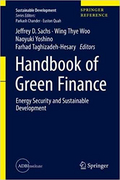Central banking, climate change and green finance
Dikau, Simon / Ulrich VolzExterne Publikationen (2019)
in: Jeffrey Sachs / Wing Thye Woo / Naoyuki Yoshino / Farhad Taghizadeh-Hesary (eds.), Springer handbook of green finance: energy security and sustainable development, Heidelberg and New York: Springer, 81-102
ISBN: 978-9-811-30226-8
DOI: https://doi.org/10.1007/978-981-13-0227-5_17
Information
Responsibility for financial and macroeconomic stability implicitly or explicitly lies with the central bank, which therefore ought to address climate-related and other environmental risks on a systemic level. Furthermore, central banks, through their regulatory oversight over money, credit and the financial system, are in a powerful position to support the development of green finance models and enforce an adequate pricing of environmental and carbon risk by financial institutions. The central topic of this chapter are the public financial governance policies through which central banks, as well as other relevant financial regulatory agencies, can address environmental risk and promote sustainable finance. The chapter first discusses the reasons why central banks should be concerned with aligning finance with sustainable development. Second, the chapter reviews the tools and instruments that can be utilized by central banks and financial regulatory agencies to address environmental risk and promote green finance and sustainable development. Third, the chapter provides a brief review of green public financial governance initiatives.


